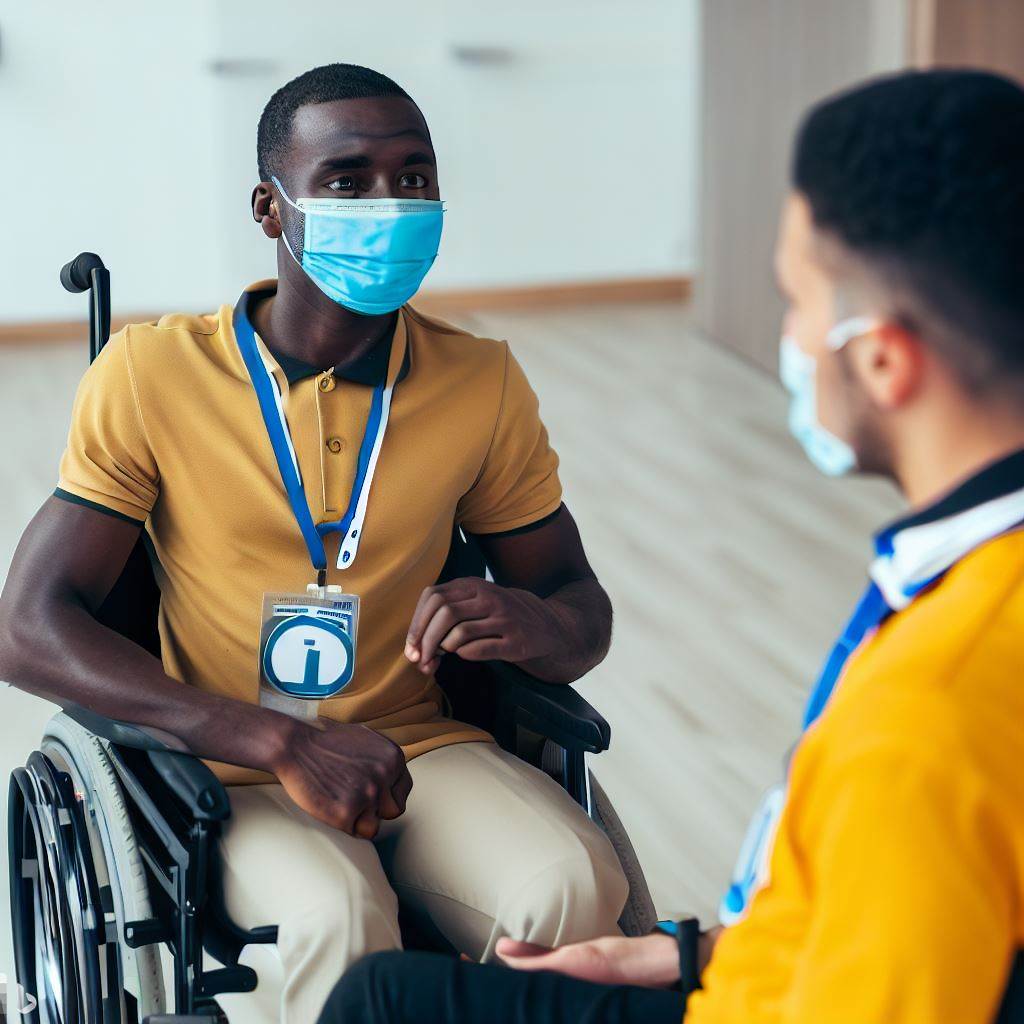Introduction
Impact of COVID-19 on Physical Therapist Assistants. The COVID-19 pandemic, a global crisis, disrupted lives and healthcare systems worldwide. Physical Therapist Assistants (PTAs) emerged as essential frontline workers, providing crucial support in patient care.
As we delve into the impact of COVID-19 on PTAs in Nigeria, let’s first understand the pandemic’s worldwide ramifications:
- Rapid spread: COVID-19, caused by the novel coronavirus, spread swiftly, overwhelming healthcare infrastructures.
- Lockdowns: Nations imposed lockdowns to curb the virus, affecting healthcare services and patient accessibility.
Now, let’s grasp the significance of PTAs in healthcare:
- Rehabilitation expertise: PTAs aid patients in regaining physical function and mobility after illness, vital during and post-COVID.
- Home-based care: With hospitals strained, PTAs contribute significantly to home-based rehabilitation, ensuring continuity of care.
- Patient education: PTAs educate individuals about preventive exercises, promoting wellness in the face of a viral threat.
In Nigeria, PTAs stepped up, bridging the healthcare gap during the pandemic, showcasing their undeniable value.
Overview of the Physical Therapist Assistant profession in Nigeria
Definition of PTAs and their role in the healthcare system
Physical Therapist Assistants (PTAs) in Nigeria’s healthcare system play a crucial role. They assist physical therapists in delivering rehabilitative care to patients. Operating under the supervision of physical therapists, PTAs aid in patient assessments.
They also execute treatment plans, document progress, and educate patients about exercises.
PTAs facilitate patient improvement in mobility, pain management, and regaining independence. Their support extends to patients with musculoskeletal, cardiovascular, and neurological conditions.
The inclusion of PTAs significantly benefits Nigeria’s healthcare infrastructure. Due to a growing population, healthcare professionals are in high demand. PTAs help fill this gap by increasing the efficiency and effectiveness of physical therapy services.
They reduce the workload on physical therapists and enhance patient outcomes. This allows physical therapists to focus on specialized treatments and complex cases.
Need for PTAs in Nigeria’s healthcare infrastructure
In Nigeria, the need for PTAs in Nigeria arises from various factors in the healthcare system. Limited resources and a shortage of healthcare professionals necessitate their role. Hiring a physical therapist alone can be financially impractical for many healthcare facilities.
PTAs offer a cost-effective solution by delivering supervised quality care. They extend the reach of physical therapy services, making it more accessible and affordable for patients.
In Nigeria, PTAs practice in diverse settings such as hospitals, clinics, and rehabilitation centers. Collaboration with other healthcare professionals ensures comprehensive patient care. PTAs undergo training and receive licensing from relevant regulatory bodies in Nigeria.
Continuing education is vital for maintaining skills and staying current with advancements. Professional associations regulate and oversee the role of PTAs in Nigeria.
Especially during the COVID-19 pandemic, PTAs’ role is indispensable in Nigeria’s healthcare system. The pandemic disrupted healthcare services, including physical therapy. PTAs adapted by integrating telehealth services into their practice.
They provided remote care and guidance during lockdowns, aiding patients in managing conditions at home and continuing their rehabilitation journey.
PTAs are essential in Nigeria’s healthcare system. Their invaluable contribution includes assisting physical therapists and providing rehabilitative care. PTAs address the demand for healthcare professionals and enhance the healthcare infrastructure.
Transform Your Career in Nigeria
Discover unmatched expertise with our personalized Career Consulting service. Navigate Nigeria’s job market with a strategy tailored just for you.
Get StartedTheir adaptability during the pandemic further underscored their importance. The profession of PTAs in Nigeria is critical for ensuring accessible and quality physical therapy services for everyone.
Read: Occupational Therapy Schools: Where to Study in Nigeria
Pre-COVID-19 Challenges Faced by PTAs in Nigeria
Physical Therapist Assistants (PTAs) in Nigeria had been grappling with several challenges even before the onset of the COVID-19 pandemic.
These challenges hindered their professional growth and the overall development of the profession in the country. Some of the key challenges faced by PTAs in Nigeria include:
1. Lack of awareness and recognition of the profession.
PTAs in Nigeria have long struggled with a lack of awareness and recognition of their profession among the general population.
Many people do not fully understand the role and importance of PTAs in the healthcare system. This has resulted in a lack of appreciation for their expertise and contributions.
2. Limited job opportunities and career growth.
PTAs in Nigeria have faced limited job opportunities and stagnant career growth. The demand for PTAs has been relatively low, leading to a scarcity of employment prospects.
This has made it challenging for PTAs to find stable and fulfilling jobs, hindering their professional advancement.
3. Insufficient training and educational programs.
The availability of training and educational programs for PTAs in Nigeria has been inadequate. Many aspiring PTAs have struggled to find quality training institutions that offer comprehensive programs.
This has resulted in a lack of skilled and competent PTAs in the country, affecting the overall quality of patient care.
These pre-existing challenges have significantly impacted the PTAs in Nigeria, both personally and professionally.
The lack of awareness and recognition has not only led to a diminished sense of professional satisfaction among PTAs but also hindered their ability to advocate for their profession effectively.
The limited job opportunities and career growth have created instances of job insecurity and limited financial stability for PTAs.
Additionally, the scarcity of training and educational programs has impeded their ability to continuously update their skills and knowledge, preventing them from providing the best possible care to their patients.
However, it is essential to acknowledge that the arrival of the COVID-19 pandemic has brought new dynamics and challenges for PTAs in Nigeria. These challenges will be discussed in the following sections to provide a comprehensive understanding of the impact of the pandemic on PTAs in Nigeria.
Read: How Much Do Occupational Therapists Earn in Nigeria?
The Arrival of COVID-19 in Nigeria and its Impact on PTAs
The outbreak of COVID-19 has significantly affected the healthcare system in Nigeria, including the role and responsibilities of Physical Therapist Assistants (PTAs). Let’s discuss the arrival of COVID-19 in Nigeria and how it has impacted PTAs.
Disruptions in healthcare services and restrictions affecting PTAs
- COVID-19’s arrival in Nigeria led to disruptions in healthcare services.
- Restrictions and lockdown measures were implemented to curb the spread of the virus.
- PTAs faced challenges in providing services due to restricted movement.
- Physical therapy clinics and hospitals reduced their operations, impacting PTAs’ work.
- Telehealth services became essential for PTAs to provide remote assistance.
Increased demand for PTAs in COVID-19 treatment centers
- The surge in COVID-19 cases created an increased demand for healthcare professionals.
- PTAs were deployed to COVID-19 treatment centers to assist patients in their recovery.
- They played a vital role in facilitating rehabilitation programs for COVID-19 patients.
- PTAs worked closely with Physical Therapists to develop personalized treatment plans.
- They aided in the recovery of patients’ physical abilities and mobility post COVID-19.
PTA’s role in providing support for patients with post-COVID-19 symptoms
- PTAs played a crucial role in supporting patients with post-COVID-19 symptoms.
- Patients often experienced respiratory and musculoskeletal complications after recovery.
- PTAs provided specialized exercises and therapies to alleviate these symptoms.
- They helped patients regain strength, endurance, and improve their overall well-being.
- PTAs assisted in managing fatigue, shortness of breath, and mobility limitations.
COVID-19’s arrival in Nigeria significantly impacted the role of PTAs in the healthcare system. PTAs faced disruptions in their services due to restrictions and reduced operations.
However, the surge in COVID-19 cases also created an increased demand for PTAs in treatment centers.
PTAs played a vital role in assisting COVID-19 patients in their recovery and providing support to individuals with post-COVID-19 symptoms. Despite the challenges, PTAs have continued to adapt and provide essential care to patients in this unprecedented time.
Read: Spotlight: Women Psychiatrists Making Strides in Nigeria

Changes and Adaptations in the PTA Profession during the Pandemic
During the COVID-19 pandemic, physical therapist assistants (PTAs) in Nigeria have had to make significant changes and adaptations in order to continue providing essential healthcare services while ensuring the safety of both patients and themselves.
These adaptations include:
- Use of telehealth and virtual consultations: With the implementation of lockdown measures and restrictions on physical contact, PTAs have turned to telehealth and virtual consultations to continue providing care to their patients.
Through video calls or telephone appointments, PTAs can assess a patient’s condition, provide guidance on exercises and rehabilitation, and monitor progress remotely. - Implementation of safety protocols and infection control measures: Recognizing the high risk of COVID-19 transmission, PTAs have implemented strict safety protocols and infection control measures.
This includes wearing personal protective equipment (PPE) such as gloves, masks, and gowns, disinfecting equipment and surfaces regularly, and practicing proper hand hygiene. These measures are crucial in minimizing the spread of the virus within healthcare settings. - Collaborations with other healthcare professionals for comprehensive patient care: PTAs have formed collaborations with other healthcare professionals, such as doctors, nurses, and occupational therapists, to ensure comprehensive patient care during the pandemic.
This multidisciplinary approach allows for a holistic assessment and treatment plan, taking into consideration the physical, emotional, and psychological needs of patients.
These changes and adaptations in the PTA profession have not only allowed for the continued delivery of healthcare services during the pandemic but have also highlighted the resilience and adaptability of PTAs in Nigeria.
Despite the challenges posed by COVID-19, PTAs have embraced new technologies and protocols to ensure the well-being of their patients.
Publish Your Professional Profile, Business or Brand
Showcase your expertise, gain trust, and boost visibility instantly on Professions.ng.
Publish NowUse of telehealth and virtual consultations
The use of telehealth and virtual consultations has proven to be an effective solution for PTAs to maintain contact with patients while minimizing the risk of transmission. Through these virtual platforms, PTAs can still provide personalized care, monitor progress, and offer advice and support to patients in need.
This has been particularly beneficial for individuals who are unable to visit healthcare facilities due to mobility issues, fear of infection, or government-imposed lockdown measures.
Implementation of safety protocols and infection control measures
In addition, the implementation of safety protocols and infection control measures has been vital in ensuring the safety of both patients and PTAs themselves. By following guidelines issued by health authorities and professional organizations, PTAs have created a safe environment for healthcare delivery.
Regular disinfection of equipment and surfaces, proper use of PPE, and adherence to hand hygiene protocols have become standard practices in PTAs’ daily routines.
Collaborations with other healthcare professionals for comprehensive patient care
Furthermore, collaboration with other healthcare professionals has proven instrumental in providing comprehensive patient care during the pandemic.
By working closely with doctors, nurses, and occupational therapists, PTAs can gain valuable insights into patients’ overall health status and coordinate their treatment plans accordingly.
This collaborative approach ensures that patients receive holistic care, addressing not only their physical rehabilitation needs but also their mental well-being in these challenging times.
The COVID-19 pandemic has necessitated significant changes and adaptations in the PTA profession in Nigeria.
The use of telehealth and virtual consultations, implementation of safety protocols, and collaborations with other healthcare professionals have become essential strategies for PTAs to continue delivering quality care amidst the ongoing crisis.
These adaptations reflect the dedication and commitment of PTAs to their profession and the well-being of their patients, showcasing their ability to adapt to challenging circumstances and embrace innovative solutions.
Read: Understanding the Pharmacy Council of Nigeria (PCN)
See Related Content: In-Depth: Nigeria’s Orthotic and Prosthetic Curriculum
Emotional and Mental Well-being of PTAs during the Pandemic
Physical Therapist Assistants (PTAs) faced daunting challenges during the COVID-19 pandemic. Their roles shifted, pressure mounted, and demands surged. But beyond the physical exhaustion, the emotional and mental toll loomed large.
Stress and Burnout Factors for PTAs Working During the Crisis
- Extended Work Hours: Many PTAs worked longer shifts. This led to physical exhaustion and emotional strain.
- Personal Risk: Treating patients meant potential exposure to the virus. This constant risk was a significant stressor.
- Increased Workload: With more COVID-19 patients requiring physical therapy, PTAs had an increased workload.
- Adapting to New Protocols: Constantly changing health guidelines meant PTAs needed to adapt quickly.
- Emotional Weight: Witnessing patient suffering and, at times, death added a heavy emotional burden.
Importance of Self-care and Mental Health Support
- Personal Connection Matters: Even a simple chat with a colleague can provide an emotional boost. Sharing experiences creates bonds and offers relief.
- Seeking Professional Help is Crucial: Therapists or counselors can provide coping techniques. They offer a safe space to vent and process emotions.
- Setting Boundaries Helps: It’s essential to know when to say no. Setting limits ensures PTAs don’t overextend themselves.
- Rest is Not Optional: Physical rest rejuvenates the body. Mental breaks help in resetting the mind. Both are vital.
Strategies for Maintaining Emotional Well-being in Challenging Times
- Regular Self-checks: Take a moment daily to gauge how you feel. Acknowledge your emotions without judgment.
- Establish a Routine: Routines provide structure. They bring a sense of normalcy in chaotic times.
- Stay Connected: Talk to loved ones regularly. Their support is invaluable.
- Limit Media Consumption: Excessive news can be overwhelming. Stay informed but don’t immerse yourself too deeply.
- Practice Mindfulness: Techniques like meditation and deep breathing help in centering oneself.
- Exercise Regularly: Physical activity releases endorphins. These natural stress relievers boost mood.
- Seek Peer Support: Sharing experiences with colleagues helps. They understand the unique challenges faced.
- Focus on What You Can Control: In unpredictable times, focus on actions within your control. This shift reduces anxiety.
- Set Aside Time for Yourself: Engage in activities that bring joy. Reading, painting, or even a quiet cup of tea can help.
- Stay Updated with Knowledge: Knowing more about COVID-19 can reduce fear. Being informed helps in feeling prepared.
The pandemic ushered in unforeseen challenges. PTAs in Nigeria, like many healthcare professionals globally, faced the brunt of these challenges head-on.
Their emotional and mental well-being took a hit, with the daily stresses of their job amplified by the pandemic’s uncertainties.
Recognizing the importance of self-care and seeking mental health support is not just crucial; it’s a necessity. In the face of adversity, it’s these self-care rituals and strategies that can help navigate through the storm.
In conclusion, PTAs, while always having been pillars of strength and support for their patients, need care themselves.
Adopting strategies to maintain their emotional well-being isn’t just essential for them but also ensures they can continue to provide the best care for their patients. In challenging times, it’s this resilience and self-care that make all the difference.
Future Outlook for PTAs in Nigeria post-COVID-19
Recognition and appreciation of PTAs’ contributions to public health
- Increased awareness of the important role played by PTAs during the pandemic.
- Recognition of PTAs as essential healthcare workers.
- Appreciation for their efforts in contributing to the overall well-being of patients.
- Inclusion of PTAs in policy-making decisions regarding healthcare in Nigeria.
- Improvement in the status and respect given to PTAs within the healthcare system.
Anticipated growth in the demand for PTAs
- Increase in the number of individuals seeking physical therapy due to COVID-19-related health issues.
- Greater recognition of the effectiveness of physical therapy in the recovery process.
- Increase in the aging population in Nigeria, leading to a higher demand for PTAs.
- Expansion of healthcare facilities and rehabilitation centers in response to the increased need for physical therapy services.
- Greater emphasis on preventive healthcare, promoting the need for PTAs in managing chronic conditions.
Opportunities for professional development and career advancement
- Access to advanced training programs and courses for PTAs to expand their knowledge and skills.
- Opportunities for specialization and certification in specific areas of physical therapy.
- Possibility of career progression within the healthcare system, with the potential for leadership roles.
- Increase in job prospects and employment opportunities for PTAs in various healthcare settings.
- Collaboration with other healthcare professionals and interdisciplinary teamwork for improved patient care.
Post-COVID-19, the future outlook for Physical Therapist Assistants (PTAs) in Nigeria is expected to be positive.
There will likely be increased recognition and appreciation of their contributions to public health, leading to improved status and respect within the healthcare system.
The demand for PTAs is also expected to grow, driven by factors such as increased awareness of the effectiveness of physical therapy, the aging population, and the expansion of healthcare facilities.
PTAs will also have ample opportunities for professional development and career advancement, with access to advanced training programs and specialization options.
Overall, the future looks promising for PTAs in Nigeria as they continue to play a vital role in the healthcare sector.
Conclusion
Throughout this blog post, we have examined the impact of COVID-19 on Physical Therapist Assistants (PTAs) in Nigeria.
The pandemic has greatly affected the work and livelihood of PTAs, but it has also highlighted their resilience and dedication in combating the virus.
COVID-19 has disrupted the healthcare system, leading to a decrease in patient volume and limited access to necessary resources and equipment.
PTAs have faced challenges such as reduced job opportunities, increased workload, and a higher risk of contracting the virus.
However, despite these obstacles, PTAs have shown incredible adaptability and commitment to serving their patients. They have quickly adjusted to new protocols and procedures, ensuring the safety of themselves, their colleagues, and their patients.
Their role in rehabilitative care has been crucial, especially for those recovering from COVID-19.
It is essential to recognize and appreciate the efforts of PTAs in Nigeria. They have played a vital role in supporting the healthcare system during one of the most challenging times in recent history. Their dedication to their patients and profession is commendable.
As we move forward, it is crucial to provide improved support and resources for the PTA profession in Nigeria.
This includes adequate personal protective equipment, access to training and development opportunities, and recognition of their essential role in the healthcare system.
Generally, the impact of COVID-19 on PTAs in Nigeria has been significant. However, their resilience, dedication, and adaptability have been remarkable.
We must continue to support and empower PTAs to ensure they can continue making a positive impact on patient care and rehabilitation in Nigeria.




